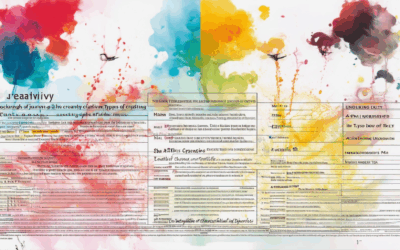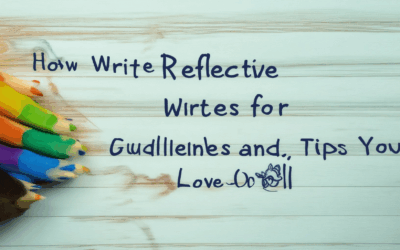Writing reflective essays can be both a challenging and rewarding experience, offering a unique opportunity to delve deep into personal thoughts and emotions. For many students and writers, crafting a compelling reflective essay requires a combination of introspection, structure, and clarity. This article dives into the intricacies of creating effective reflective essays, providing proven strategies and insights to help you enhance your writing skills. Whether you’re aiming to explore complex themes, reflect on personal growth, or analyze broader societal issues, this guide will equip you with actionable tips and techniques to excel in the craft of reflective writing. From understanding the key elements to consider when starting your essay to learning how to revise and refine your work, this article covers everything you need to know to master the art of reflective essays. Join us as we uncover the secrets to writing reflective essays that resonate with readers and leave a lasting impact.
Key Takeaways
- Craft a Strong Thesis: Begin with a clear, focused topic to guide your reflective essay.
- Embrace Authenticity: Share genuine emotions and experiences for deeper reader connections.
- Foster Critical Thinking: Analyze your experiences to uncover meaningful insights.
- Structure Your Essay: Organize your thoughts logically for enhanced readability.
- Incorporate Specific Examples: Use personal anecdotes to illustrate your points vividly.
- Ensure Clarity and Flow: Maintain a smooth narrative with coherent transitions.
- Conclude with Impact: End with a thought-provoking conclusion to leave a lasting impression.
- Seek Feedback: Leverage external insights to refine your essay.
- Highlight Growth: Showcase your journey of personal development over time.
- Balance Narrative with Analysis: Combine storytelling with deeper evaluations for a richer essay.
- Engage Readers Emotionally: Share relatable experiences to create resonance.
- Master Transitions: Use logical connectors to maintain a seamless flow.

How Can I Improve My Reflective Essay?
To enhance your reflective essay, consider the following structured approach:
- Hook and Context
- Organization and Depth
- Transitions and Flow
- Summarization and Insight
- Quality Assurance
- Authenticity and Tone
- Growth Over Time
Begin with a personal anecdote or intriguing question to capture attention. For instance, recount a significant moment in your life, such as overcoming a challenge, and set the stage for your narrative by defining reflection for your perspective.
Structure each paragraph around a clear theme or lesson. Use specific examples from your life, such as failing a test, to illustrate your points. Incorporate sensory details to immerse the reader in your experience, describing settings, emotions, and atmospheres. Employ varied vocabulary to convey precise thoughts and demonstrate growth over time, showcasing before-and-after scenarios.
Use transitional phrases like “however” or “in addition” to ensure a logical progression. Vary sentence structures to maintain reader engagement and avoid monotony.
Wrap up by summarizing key lessons and reflecting on your journey. Consider ending with a positive note or call to action to inspire further reflection in others.
Seek external feedback if possible, or read your essay aloud to identify areas for improvement. Proofread meticulously to ensure clarity and correctness, avoiding grammatical errors.
Keep the tone personal and authentic, allowing your true self to shine through. Balance storytelling with analytical depth, explaining how events contribute to your growth.
Showcasing your journey of growth and learning, highlighting progress before and after scenarios to make your essay more compelling.
By adhering to this structured approach, you can create a reflective essay that is both engaging and meaningful, effectively conveying your journey of growth and learning.
Key Elements to Consider When Starting a Reflective Essay
A reflective essay is a personal and introspective piece of writing that explores your thoughts, emotions, and experiences. To craft an effective one, consider the following key elements:
- Purpose and Focus : Begin by clarifying your intention. Are you reflecting on a personal growth moment, a life event, or a broader theme like identity or philosophy? Knowing your purpose will guide your content and help maintain coherence.
- Topic Selection : Choose a topic that resonates with you personally. It could be a memorable experience, a challenge you’ve overcome, or a passion project. The best topics are those that evoke strong emotions and allow for deeper exploration.
- Structure and Organization : Plan your essay with a clear structure. Typically, this includes an introduction, body paragraphs detailing your reflections, and a conclusion that ties everything together. Use subheadings to organize your thoughts visually.
- Personal Experiences : Reflect on your unique experiences and how they contribute to the broader themes you’re exploring. Authenticity is key in a reflective essay, so draw from your own life to make your writing relatable and genuine.
- Vivid Descriptions : Use descriptive language to paint scenes and convey emotions. Whether it’s a place, a feeling, or an event, rich details will immerse your reader in your narrative.
- Analysis and Insight : Go beyond mere recounting events. Analyze your experiences, explore underlying meanings, and connect them to universal concepts or larger life questions. This adds depth and intellectual value to your essay.
- Reflection and Growth : Use your essay as a tool for self-discovery. Reflect on what you’ve learned, how you’ve changed, and how these insights might benefit others reading your work.
- Revision and Editing : Edit your draft to refine your voice, eliminate redundancies, and enhance clarity. Ensure your essay flows smoothly and maintains a consistent tone throughout.
For inspiration and support during your writing journey, explore Silken Drum’s community-driven platform. Connect with fellow writers, discover reflective essays, and find resources to help you grow as a writer. Visit Silken Drum today!
Remember, the most important aspect of writing a reflective essay is to stay true to yourself and your experiences. With patience and practice, your words will become a powerful medium for self-expression and personal growth.

What Are the Key Elements to Consider When Writing a Reflective Essay?
Reflective essays require careful thought and organization to effectively convey personal growth, learning, or insight. Here are the essential elements to keep in mind:
- Clear Purpose and Focus : Define the central theme or question your essay will explore. Whether reflecting on a past experience, a belief, or a concept, ensure your purpose is clear to guide your writing.
- Engaging Introduction : Begin with a hook that captures attention, such as a vivid anecdote or thought-provoking statement. Introduce your topic and briefly outline your thesis or main idea.
- Body Paragraphs with Depth : Each body paragraph should delve into specific experiences, emotions, or observations. Use descriptive language to paint a picture and analyze your thoughts critically. Connect your ideas logically to maintain coherence.
- Critical Thinking and Analysis : Reflect on your experiences by asking questions and exploring underlying meanings. Avoid mere recounting events; instead, examine what you’ve learned and how it impacts your perspective.
- Smooth Transitions : Use transition words or phrases to connect ideas smoothly. This helps the reader follow your narrative without getting lost.
- Conclusion That Resonates : Summarize your journey of reflection, emphasizing growth or insight gained. Conclude with a meaningful quote, reflection, or call to action that ties everything together.
By focusing on these elements, you can craft a reflective essay that is both deeply personal and universally relatable. To inspire your writing journey, explore Silken Drum’s resources and community support for creative thinkers: Silken Drum .

What Are the Key Components Needed for Writing an Effective Reflective Essay?
A reflective essay is a personal and introspective piece of writing where an individual explores their thoughts, feelings, and experiences in relation to a specific topic or event. To write an effective reflective essay, several key components must come together seamlessly. Here’s a breakdown of what you need:
- Clear Topic or Thesis Statement :
Start with a focused topic or central idea that you want to explore. A strong thesis statement will guide your essay and keep you on track. For example, if you’re reflecting on a personal growth experience, your thesis might be, “This experience taught me the importance of resilience.” - Personal Reflection and Growth :
The essence of a reflective essay lies in its personal and authentic nature. Share your genuine thoughts, emotions, and lessons learned from your experiences. This helps readers connect with you on a deeper level and see your growth over time. - Critical Thinking and Analysis :
Reflective essays require more than just recounting events. They demand critical thinking—analyzing your experiences, challenges, and successes. Consider asking yourself questions like, “What did I learn from this?” or “How has this affected my perspective?” - Structured Approach :
While reflective essays can be personal, they benefit from a logical structure. Divide your essay into sections: an introduction, body paragraphs detailing your reflections, and a conclusion that ties everything together. This organization helps your ideas flow naturally and makes your essay easier to follow. - Emotional Vulnerability :
Authenticity is key. Don’t shy away from sharing difficult emotions or challenges. Emotional vulnerability adds depth to your essay and makes your reflections more relatable to others. - Relevant Examples and Anecdotes :
Use specific examples from your life to illustrate your points. Whether it’s a challenging situation or a moment of triumph, concrete details bring your reflections to life and make your essay more engaging. - Clarity and Cohesion :
Ensure your writing is clear and concise. Avoid vague statements and aim for coherence in your narrative. Each paragraph should transition smoothly to the next, maintaining a consistent tone throughout. - Conclusion That Resonates :
Wrap up your essay with a thought-provoking conclusion that encapsulates your reflections and shares any insights or lessons you’ve gained. This leaves the reader with something to ponder long after finishing the essay.
By combining these elements, you’ll craft a reflective essay that is not only personal but also rich in meaning and impact. If you’re looking for inspiration or tips, visit Silken Drum to explore our collection of reflective writing guides and examples.
How Can I Improve My Reflective Essay?
To enhance your reflective essay, consider the following structured approach:
- Hook and Context
- Organization and Depth
- Transitions and Flow
- Summarization and Insight
- Quality Assurance
- Authenticity and Tone
- Growth Over Time
Begin with a personal anecdote or intriguing question to capture attention. For instance, recount a significant moment in your life, such as overcoming a challenge, and set the stage for your narrative by defining reflection for your perspective.
Structure each paragraph around a clear theme or lesson. Use specific examples from your life, such as failing a test, to illustrate your points. Incorporate sensory details to immerse the reader in your experience, describing settings, emotions, and atmospheres. Employ varied vocabulary to convey precise thoughts and demonstrate growth over time, showcasing before-and-after scenarios.
Use transitional phrases like “however” or “in addition” to ensure a logical progression. Vary sentence structures to maintain reader engagement and avoid monotony.
Wrap up by summarizing key lessons and reflecting on your journey. Consider ending with a positive note or call to action to inspire further reflection in others.
Seek external feedback if possible, or read your essay aloud to identify areas for improvement. Proofread meticulously to ensure clarity and correctness, avoiding grammatical errors.
Keep the tone personal and authentic, allowing your true self to shine through. Balance storytelling with analytical depth, explaining how events contribute to your growth.
Showcasing your journey of growth and learning, highlighting progress before and after scenarios to make your essay more compelling.
By adhering to this structured approach, you can create a reflective essay that is both engaging and meaningful, effectively conveying your journey of growth and learning.

Key Elements of a Successful Reflective Essay
A successful reflective essay is characterized by several key elements that contribute to its depth, coherence, and impact. Here’s a breakdown of these essential components:
- Clarity of Purpose : A reflective essay should have a clear central theme or message. This focus ensures that the essay remains organized and meaningful. Before writing, ask yourself: “What am I trying to convey through this essay?”
- Introspection : Reflective essays require deep self-examination. The writer connects personal experiences, emotions, and thoughts to broader themes or ideas. This connection is what makes reflective writing unique and impactful.
- Critical Reflection : Beyond mere personal storytelling, a successful reflective essay involves analyzing and evaluating the content. Consider questions like: “How does my narrative reveal something about myself?” and “What could be improved?”
- Emotional Engagement : Effective reflective essays resonate emotionally with readers. By sharing genuine feelings and experiences, writers create a relatable and compelling story that invites others to reflect on their own lives.
- Coherence and Flow : A well-structured essay moves logically from one idea to the next, creating a seamless narrative. Use transitions to connect paragraphs and ensure each section builds upon the previous one.
To enhance your reflective writing journey, explore Silken Drum’s resources on essay writing and join our community of like-minded writers. Discover tips, inspiration, and forums dedicated to refining your craft at Silken Drum .
By focusing on these elements, you can craft a reflective essay that is not only deeply personal but also rich in meaning and resonance.




0 Comments